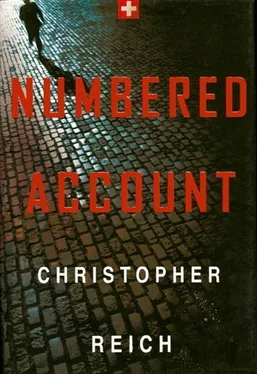Kaiser gritted his teeth. “I’m only worried for the bank,” he said in his most professional voice. But inside his head another voice chided young Neumann. Damn you, Nicholas! I wanted you at my side. Seeing you walk into my office that day was like seeing your father all over again. If I could have convinced you to stay at my side, then I would have known that the course I set for the bank, the actions I undertook to ensure we reached our destination, however extreme, were correct. It was your father who was mistaken, not me. The bank is bigger than one man. Bigger than a friendship. I thought surely you would have recognized that. Now, what am I going to do with you?
“Nicholas doesn’t know the half of his father’s death,” he said, inventing wildly. “Alex Neumann was responsible for his own murder. He had been involved in drugs. Using cocaine on a daily basis. We were about to fire him for embezzling from the Los Angeles office.”
Sylvia sat up straighter, letting the sheet fall from her chest. “You never said anything about this before. Why haven’t you told him these things?”
“We kept it from the family. It was Gerhard Gautschi’s decision at the time. We felt it was the least we could do to comfort them. I don’t want Nicholas to find out. It would open too many wounds.”
“I think Nick should know. It would give him a reason to end this silly search. He won’t stop until he finds out something. I know him. Even if it is bad news, he’ll want to know. It’s only fair. It was his father, after all.”
Christ, now the girl had a conscience. “You will not repeat a word of what I’ve told you to Neumann.”
“But it would mean so much to Nick to know. We can’t hide this from—”
“Not a word,” Kaiser shouted, unable to master his mounting anxiety. “If I learn you’ve told him, you won’t have to worry about Konig eliminating your post. I’ll fire you myself. Is that clear?”
Sylvia flinched. He had scared her. “Yes,” she said softly. “It’s very clear.”
Kaiser stroked her cheek. He had overreacted. “I apologize, darling, for raising my voice. You can’t imagine the strain we’re under. We can’t allow any harm to come to the bank in these next days, not the slightest innuendo of misdoing. My concerns are for the bank, not myself.”
Sylvia nodded her head in understanding.
Kaiser saw that her heart was divided. She needed a reminder of what the bank could do for her. “About the promotion. To first vice president?”
Sylvia raised her eyes to him. “Yes?”
“I don’t see why we’ll have to wait much longer. We can finalize things right after the general assembly. It’ll give you some more clout with the big boys in New York City.”
“You’re sure?”
“Of course I’m sure.” He lifted her chin with an outstretched finger. “But only if you’ll forgive me.”
Sylvia considered the request for a moment. Then she laid her head on his chest and sighed loudly. Her hand delved under the covers and soon it was massaging him. “You’re forgiven,” she whispered.
Kaiser closed his eyes, abandoning himself to her touch. If only Nicholas Neumann were so easily bought.
General Dimitri Marchenko arrived at the gates to Ali Mevlevi’s compound at ten o’clock Sunday morning. The sky was a magnificent royal blue. Hints of cedar danced in the air. Spring was practically here. He stood in his jeep and signaled the line of trucks behind him to halt. A uniformed sentry fired off a crisp salute and opened the gate. Another sentry jumped onto the running board of his command jeep, pointing the way forward with an outstretched arm.
The convoy thundered into the compound, climbing a gentle incline that paralleled a playing field. The trucks crossed an asphalt parade ground and stopped in front of two large doors cut into the face of a hundred-foot cliff. Marchenko stared at the two enormous hangars, impressed by the feat of engineering. Inside the hangar to his right sat two helicopters: a Sukhoi Attack Model II and a Hind Assault. He had sold them to Mevlevi three months ago. The sentry directed the jeep toward the helicopters, then dropped his arm, indicating they should stop.
Colonel Hammid jogged to Marchenko’s jeep. He pointed into the hangar. “Order the truck carrying the ‘communications gear’ to go there. Then you must advise us which chopper is better suited to carrying such sensitive ‘eavesdropping equipment.’ “
Marchenko grunted. Evidently, Hammid knew the true nature of the cargo being transported. It figured. No one could keep a secret in this part of the world. “The Sukhoi. It is faster and more maneuverable. The pilot will need to climb sharply after deploying the weapon.”
The Syrian commander offered his oiliest smile. “You do not know Al-Mevlevi’s troops. The pilot will not return. He will set the bird down and then detonate the weapon. This way there will be no failure.”
Marchenko simply nodded and climbed out of the jeep. He had never understood the roots of fanaticism. He walked to the driver of the truck that carried the Kopinskaya IV and said a few words to him in Kazakh. The driver nodded brusquely and when Marchenko stepped back, drove the truck into the hangar, stopping it near the sleek Sukhoi helicopter. Marchenko marched to the next truck in line and ordered his soldiers into the hangar. Twenty men poured from its bay and marched at double time toward the helicopter.
Marchenko wanted to attach the Kopinskaya IV to the helicopter as soon as possible. If there was any problem with the device, he wanted to know now, while time remained to remedy it. There was little risk of a renegade stealing the chopper with the bomb attached. Hammid clearly had orders to protect the weapon at all costs. Marchenko had given his soldiers the same instructions. To be safe he would order the hangar doors closed until five minutes prior to the helicopter’s departure.
Marchenko supervised the unloading of the Kopinskaya IV device. After the crates filled with outdated radio equipment had been removed, he climbed into the bay and deactivated the explosive antitampering device. He took a set of keys out of his pocket and, selecting one, inserted it into a lock drilled into the chassis of the truck. He turned the key sharply to the right, withdrew it, then pulled open the container’s door. A wooden crate no different from the others littering the hangar floor sat inside it. He yelled for his men to take it out and set it down near the chopper.
Marchenko found a crowbar in the back of the truck and opened the crate. He peered inside. A stainless steel canister three feet high and two feet in diameter rested in a bed of foam rubber. He slipped a hand under one end and eased it from its housing. The canister weighed just thirty pounds. He grunted as he lifted it from the crate and set it down on the smooth hangar floor.
The bomb itself was not much to look at. Marchenko thought it resembled a large tear gas canister with one end domed and the other flat. Height: twenty-eight inches. Diameter: nine inches. Weight: eleven pounds. Its casing was made from unpolished high-tensile steel. It was an altogether unimpressive-looking object.
But it could kill.
The Kopinskaya IV carried four hundred grams of enriched plutonium 238 that when detonated had the explosive force of two thousand tons of high-grade TNT. A measly throw weight in terms of the big birds, but devastating nonetheless to any object, either living or inert, within a one-mile radius of ground zero. Anything within five hundred yards would be instantly vaporized. Inside of a thousand yards the bomb achieved a ninety-five-percent kill rate at detonation. The other five percent would die within two hours from a lethal dose of gamma radiation. The kill rate tapered off dramatically at a mile out. At three thousand yards, only twenty percent would be killed by the detonation, and those mostly by the debris blown outward from the epicenter: shards of glass, splinters of wood, chunks of concrete all propelled through the air at speeds over a thousand miles an hour. A city provided its own shrapnel.
Читать дальше












